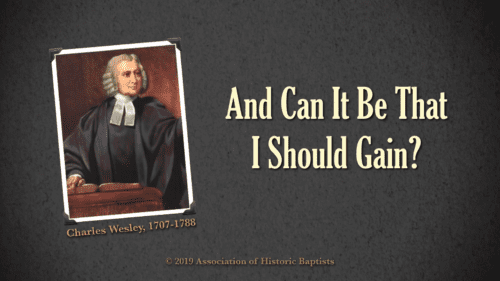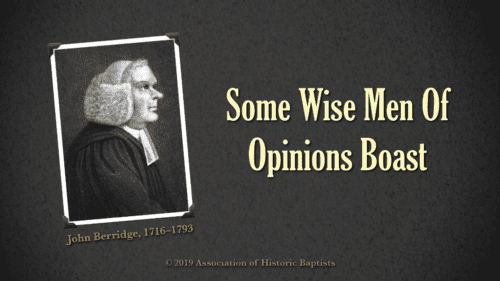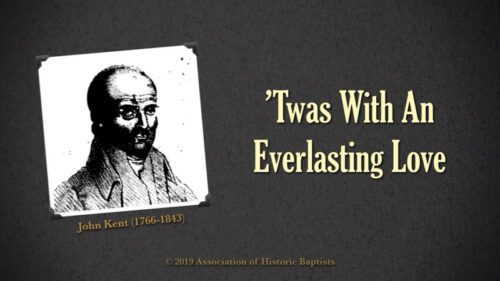Expand, My Soul, Arise And Sing
2 Timothy 1:8,9: “Be not thou therefore ashamed of the testimony of our Lord, nor of me his prisoner: but be thou partaker of the afflictions of the gospel according to the power of God; Who hath saved us, and called us with an holy calling, not according to our works, but according to his own purpose and grace, which was given us in Christ Jesus before the world began…”
Ephesians 1:5-12: “Blessed be the God and Father of our Lord Jesus Christ, who hath blessed us with all spiritual blessings in heavenly places in Christ: according as he hath chosen us in him before the foundation of the world, that we should be holy and without blame before him in love: having predestinated us unto the adoption of children by Jesus Christ to himself, according to the good pleasure of his will, to the praise of the glory of his grace, wherein he hath made us accepted in the beloved. In whom we have redemption through his blood, the forgiveness of sins, according to the riches of his grace; wherein he hath abounded toward us in all wisdom and prudence; having made known unto us the mystery of his will, according to his good pleasure which he hath purposed in himself: that in the dispensation of the fulness of times he might gather together in one all things in Christ, both which are in heaven, and which are on earth; even in him: in whom also we have obtained an inheritance, being predestinated according to the purpose of him who worketh all things after the counsel of his own will: that we should be to the praise of his glory, who first trusted in Christ.”
William Tucker (1731-1814) was an English Baptist author and hymn writer, best know for two outstanding works, "Predestination Calmly Considered" and "Arminianism Dissected”. Among his popular hymns are, “O love, beyond conception great”, “Expand, my soul, arise and sing” and “Fix'd was the eternal state of man”. John Gadsby wrote of him:
“Tucker (William) was born at Chard, Somerset, March 27th, 1731. His parents were members of the Church of England, and honest and upright. William was no stranger, even while young, to convictions of sin; but, beginning in legal fear and ending in a false peace, they were merely transient, passing away like the morning cloud or the early dew in the East. He served an apprenticeship at Chard, and then removed to London. Here he went to hear the great apostle of England, George Whitefield, and the word was fastened on his soul. To use his own words, "I heard and felt it too." Some time afterwards he returned to Chard, and there settled for life. He grew daily more and more acquainted with the plague of his heart, the spirituality of God's law, and the unsearchable riches of his grace. In 1764, he commenced business as a cutler and ironmonger, which he continued for 37 years. For some time after he returned to Chard, he was a Psedobaptist; but being led to examine the Scriptures, he was constrained to become a Baptist, was baptized in 1765, and immediately joined the Baptist Church at Chard, of which he remained a member for 48 years. Though he was looked up to as "an ornament of the church," he ever exclaimed, "By the grace of God I am what I am." He was often the subject of misgivings respecting his state before God; but even in the midst of these he seems to have been so much supported that he sometimes said he was "not anxious to live nor afraid to die." The poor had a share in his bounty, and he was ever ready to heal a breach in the church. The evening before his death, he was unusually cheerful, and retired to rest soon after 9 o'clock. The next morning, Feb. 2nd, 1814, he told his servant he felt ill all over, and that he should soon be gone. He then reclined his head on his pillow, and in a few minutes, without a struggle or sigh, breathed his last, in the 83rd year of his age. It does not appear that Tucker ever stood up to preach, as he was not blessed with the gift of utterance; but this was amply made up for by his pen. His works,"Predestination Calmly Considered," and "Arminianism Dissected," were his masterpieces in favor of Calvinism. He also wrote a variety of pieces in the Gospel and Baptist Magazines against Pre-Existerianism. His hymns, “O love, beyond conception great”; “Expand, my soul, arise and sing”; “Fix'd was the eternal state of man”; were originally inserted in the "Gospel Magazine," for 1772, &c The best hymn which, to my mind, Tucker, wrote has usually appeared without signature; but I found it in the "Gospel Magazine" with Tucker's signature. I refer to "Amidst ten thousand anxious cares.”
William Tucker Hymns






